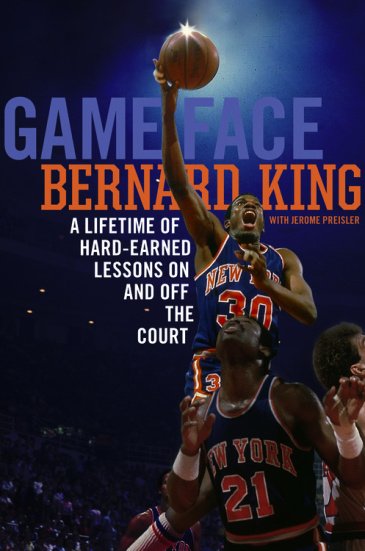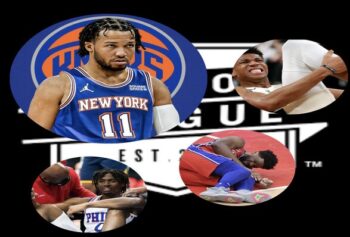New York Knicks and NBA legend Bernard King was notoriously private during and after his playing days. He rarely spoke to the press, and when he did it was never about anything other than basketball. For people that watched him at his apex in the 1980’s, especially fans that appreciated the utter brilliance and tenacity that he brought to the court every night in Madison Square Garden, there’s always been a longing to learn more about the man who we called “The King of New York.”
Now, close to 25 years after playing his final NBA game, King has delivered a delightful and heartfelt memoir – Game Face: A Lifetime of Hard-Earned Lessons On and Off the Basketball Court, taking readers behind the curtain of his career, but more importantly shedding light on who he is as a man, and how he arrived there.

From the Walt Whitman projects in Fort Greene, Brooklyn, King opens the door to his childhood home and the forces that coalesced to form one of the greatest basketball talents the world has ever been fortunate enough to see.
Before he became one of the most decorated and celebrated athletes of his era, King was one of six children growing up in a cramped apartment where both money and emotional support were scarce.
People saw his amazing exploits on the basketball court at Fort Hamilton High School, the University of Tennessee and in the NBA, but now they get to see the young man who wore hand-me-downs, who couldn’t afford haircuts, who had to fight his and his siblings battles on the streets to keep the bullies at bay and earn his respect.

“I didnt feel love in our household, ” King says in the opening chapter, The Birth of my Game Face. “I had no frame of reference, no outside points of comparison, no way of knowing if my existence was
different from that of other kids. I sensed something was missing in my life, but I couldnt identify what it was. I tried, with the limited understanding of a young boy. But it was akin to looking through a window
and finding it too smudged and dirty to see through with any clarity. In those days, I rarely smiled or laughed. I had no outlet for my emotions or creativity, and no way to channel them. Nowhere.
Except for the basketball court.”
The book is much more than a recollection of great games and athletic exploits. He does delve into the matchups against Michael Jordan, Julius Erving, Magic, Charles Barkley, Larry Bird and others,but the true strength of the narrative has nothing to do with basketball. He examines the youth and environment that forged him, his difficult family dynamics off the court and his desire to break free from a personal cycle of negativity and self-destructiveness that once engulfed him.
Just as he did with his otherworldly skills when lighting up the New Jersey Nets for 60 points on Christmas Day in 1984, his words and insights in sharing his life journey are engaging, shocking and revelatory.
NBA Christmas: Bernard King Scores 60
Celebrating the 30th anniversary of Bernard King’s Madison Square Garden record 60 points on Christmas Day 1984. About the NBA: The NBA is the premier professional basketball league in the United States and Canada.
If you were fortunate enough to watch Bernard King in his prime, you’ll recall that you felt something special whenever you watched him play. And after reading his memoir, those feelings will resurface again, but with much more depth and nuance.
The Shadow League recently caught up with the NBA Hall of Famer as he sat a stone’s throw away from his former home at Madison Square Garden to talk about hoops, his life and what he hopes people will take away from reading his story.
***
The Shadow League: After all these years, why did you decide that now was the time to tell this story?
Bernard King: I’d been approached in the past about writing a book, but I didn’t think that the time was right. I never wanted to write just another basketball biography. I was sitting in my home at 2 o’clock in the morning one day and my daughter was getting ready to go off to college for her freshman year that afternoon. I started reflecting and thinking about my life. I’ve always been a very private person and for years, I was focused on raising my daughter with my wife.
When a child goes off to college, it really is akin to leaving the nest, so to speak. It was a time for reflection and in looking back, I realized that I had an important story to tell, and perhaps it would help someone in their own journey. It’s about my journey, but there are stories within the story that I think will appeal to the reader. It’s very insightful and may help to inspire others.
TSL: A few weeks ago, I was fortunate to meet and share the stage with your co-writer on this project, Jerome Preisler, at the Varsity Letters sports author’s speaker series in Manhattan. When he started talking about you, he got emotional in sharing some of the things you shared with him in your conversations during the crafting of this book. Did you feel like you would have such a profound impact on people when you initially began to share these stories and memories?
BK: I was so immersed in the writing of the story and the feelings of joy, and sometimes the cathartic feelings of pain. I’m just grateful that I had a platform because of my Hall of Fame basketball career that gave me an opportunity to write this book. And pairing with Jerome was wonderful, we had a tremendous chemistry. He’s from Brooklyn as well and we’re the same age, so there was an innate understanding of the experiences that I went through along my journey.
The impact that it has was not something I thought about during the writing process. The outcome of the book is very satisfying to me. Thus far, it seems to have been received very well.
Bernard King: A Scoring Machine
NBA Hall of Famers talk about Bernard King’s scoring ability and how he was tough to stop because of the arsenal of moves he possessed. About the NBA: The NBA is the premier professional basketball league in the United States and Canada.
TSL: Take us back to the essence of your childhood in the Walt Whitman Houses in Fort Greene, Brooklyn. You paint those scenes so vividly in the book, from kids making fun of you, to the smells of food cooking, to the water dripping on your forehead from the hand-scrubbed clothes hanging on the clotheslines that ran from room to room, to longingly looking out of your apartment window at the basketball courts below. Early on, your father frowned on you spending time on those basketball courts, didn’t he?
BK – Yes. I started playing in the third grade at P.S. 67. I’ll never forget the day that I experienced the joy of basketball. I was attempting to make a shot on the rim that was in the lunchroom. I had a hard time just getting the ball to even reach the rim. I continued to try and when it fell through the net, the feelings of joy and jubilation were simply amazing. I started jumping up and down, and that was something I’d never experienced before in my life. I wanted to continue to feel that all the time. Once I got that first taste, I wanted more and fell in love with the game.
I grew up in a very strict household. My parents were very religious. Every day, my father would come home from work, go into the back room, eat his dinner and read his bible, then get dressed in his suit to go off to church. Through the course of that upbringing and lifestyle, we weren’t allowed to go outside after church on Sunday.
As I started to get older, some of the best games and tournaments were on Sundays. I spent hours and hours trying to improve as a young player because I loved this game. And I wanted to go out on Sunday and play ball to test myself against the best players. There came a point where I had to challenge my father’s edict.

TSL: So how did you do that?
BK: One Sunday morning when I was in the eighth grade, I decided I wasn’t going to dress for church. He said, “You’re not dressed for church.” I said, “I’m not going to church today.” He gave me a look, but I stood my ground. He said, “What do you mean you’re not going to church?” I told him, “I wanna play ball. You’re life is in the church, my life is on the basketball court. And I’m not going to church!” Things got tense and my mother spoke up, telling my father, “Leave him alone!”
I won’t give away the rest because I want people to read the story. But I aspired to be great in basketball and worked very hard at it. In life, if you want to achieve a goal, you have to aspire to be great at what it is that you do. I aspired to greatness, wouldn’t let anything stand in my way, and continued to develop my craft and worked at it. And ultimately, I achieved my dream.
TSL: When did the proverbial lightbulb go off in your head, when you realized that you weren’t just good at the game, but that you had a chance to be exceptional?
BK: I spent hours upon hours crafting my skills, and I arrived a point where I realized that I had a gift. I wasn’t born with it. I worked and worked and worked and eventually it began to emerge. That emergence occurred during the time when I was in junior high school. And by the time I got to high school, I began to dominate there and in playground tournaments. That’s when I realized how good I was.
Classic Shootout: Isiah vs Bernard King 1984
Joe Louis Arena, April 1984… Game Five of the East First Round.. Detroit Pistons and New York Knicks have the series tied at 2-2. Isiah Thomas and Bernard King go at it! Winner take all…
TSL: Were you consumed with dreams of making it out of the projects and getting to the NBA?
BK: I wasn’t thinking about the NBA back then. My attitude was simply that I wanted to be the best player on the level that I was on at the time. That was always my objective. Oftentimes, we have long term and short term goals, but if we don’t plan accordingly and look too far ahead on the path, then we don’t put in the work that’s necessary to master the level that we’re currently on. And I would never allow anyone to outwork me.
TSL: I was fascinated when Jerome spoke about how you, on your own accord and following your own inner voice as a kid, gravitated toward psychology books.
BK: Yes, as a young kid I read psychology books and spent a lot of time in the library. My idol was Sidney Poitier. He had a tremendous influence on me as a young person. I wanted to be like him, speak like him, dress as impeccably as him.
I spent a lot of time reading psychology books and through those, I learned about focus. I learned about being analytical. And I learned about the mindset and thought process that goes into all of that. And that’s really what I built my entire career on, as well as my life. So it transcends the game on the court. It’s how I live.
TSL: Today, the psychology behind the game, the mental part, the visualization techniques, the mindfulness thinking, there’s a whole cottage industry behind that. You were light years ahead of your time in that aspect. How did you gravitate towards that on your own?
BK: I was always interested in learning. And I was always interested in figuring things out. So when I played ball, there were so many aspects to succeeding in the game that fascinated me. I tried to fractionalize the game and break it down so I could become proficient at every aspect, whether it was passing, scoring, rebounding, positioning, changing pace, developing unstoppable moves, etc.
Most of that I did on my own. I created a grid pattern for myself by experimenting and figuring things out. I had set places on the floor, from the right and left-hand side, and from the center of the rim to the top of the key. And I became proficient at initiating moves and making shots from those places, developing moves based on how defenses played me, whether it was a zone, a trap, man-to-man or double teams. That’s how I became good. I thought the game out.
Bernard King Inducted into the Hall of Fame
Check out a tribute to the great career of Bernard King as he is enshrined in the National Basketball Hall of Fame. About the NBA: The NBA is the premier professional basketball league in the United States and Canada.
TSL: Who were some of your stylistic role models growing up, whether it was an older guy on the playground that you emulated, or a local cat that came before you like Connie Hawkins that was out there just giving cats the business. Who influenced your game in terms of wanting to pattern some things after?
BK: That’s a great question. Playing ball in the inner city, it made you tough. If you’re not tough on them courts in Brooklyn, Harlem, The Bronx and Queens, then you can’t play. It’s a very physical game laced with a lot of finesse and beauty. So I became a very physical, aggressive, tough-minded player because of the way we played ball in Fort Greene.
There was no real influence of other people’s style on my game. We didn’t have cable TV back then, we didn’t have the internet and highlights, basketball wasn’t being televised like that. I never attended a pro or college game at Madison Square Garden until I played there because I couldn’t afford a ticket. I just developed my own game playing on the New York City playgrounds.
TSL: That makes sense, considering that I’ve never a seen a player quite like you, before or since. So in addition to calling you “The King of New York”, I’m gonna start referring to you as “Basketball’s Ol’ Dirty Bastard”, because there ain’t no father to your style.
One thing I always loved in watching you when I was growing up was the musical syncopation and the rhythms that were laced in your game, in your unique on-court boogie. I know that music was a big part of your essence, and I loved when Jerome shared the story about the first time you heard some real soul music, outside of what you grew up listening to in church, when you were at a buddy’s apartment in the projects as a kid and his mother was cooking some food.
BK: It wasn’t just food. She was cooking chitlins! I hated that smell. I was never allowed to listen to music in my household. I wasn’t allowed to do things like go to the movies. So hanging out with my friend Stanley was great. I had a small pocket transistor radio that would give me my musical fix. And we would sit in his apartment and listen to music all day long, listening to the great R&B singers of the day.
Music was always an influence on me. So I played the game feeling and walking in rhythm, that was my style of play. There was a finesse to my game with my speed, quickness and acceleration, and I felt all of that musical energy. It was magical.
SON OF THE CITY: BERNARD KING
Uploaded by ginoongkamote on 2015-03-27.
TSL: I get upset when people regurgitate the lazy narrative about the ’80s being all about Larry Bird and Magic Johnson. That’s because as kids, me and my friends followed and loved that work you were giving out with the Knicks. Your scientific mastery of scoring the ball and the beautiful brilliance within the game needs to be mentioned when anyone talks about that great era of basketball. Talk about that era, because you played a big part in helping to catapult the league along its trajectory towards the status that it enjoys today.
BK: You’re talking about some great players there when you mention Magic and Bird. And obviously for me, the standard will always be Dr. J. It was a period when the game experienced a tremendous growth thanks to television. They were brilliant players, and playing against them like that, on that level, was wonderful and amazing. However, you don’t think about it during the course of playing the game. You know that you’re going up against guys that are unique and gifted, and I was always inspired and motivated to bring my “A” game.
I played against 51 Hall of Famer’s during my career. That’s incredible. And oftentimes, it was at the small forward position, where I was facing a Dr. J, Larry Bird, Alex English, Adrian Dantley, James Worthy. I was facing all of these great players on a nightly basis and I knew that I had to deliver for my team. I loved the challenge. I relished it when I stepped on the floor, to prove that I had the same skills and abilities.
That’s how I approached the game. And I’m honored that the players of the NBA during my day, my peers, voted me MVP of the league in 1984. That says something.
Michael Jordan vs Bernard King First Meeting Epic Duel Of Brooklynites! (Bulls @ Knicks, 1984)
Michael Jordan and Bernard King meets first time and it was going down in Mecca of basketball, Madison Square Garden. It was the battle for who owns the Brooklyn. Michael Jordan, Bernard and his brother Albert King and boxing legend Mike Tyson born same hospital in Cumberland Hospital In Fort Greene Brooklyn, NY.
TSL: Right now, you’re sitting across the street from Madison Square Garden as we’re having this conversation. When you see that building, and when you step back inside, what emotions and feelings come to the surface?
BK: I visualize and see myself running down the floor and flying as if I had wings. And when I played, I had goosebumps on a nightly basis whenever I put on that Knicks uniform. I felt like I was representing the legacy of the franchise – Willis Reed, Earl Monroe, Walt Frazier, Dave DeBusschere, Bill Bradley and all of the great Knicks.
I represented them every single night. And as a kid from Brooklyn, I also represented the heart and soul of New York City every time I played the game. And I think that’s why I still have a great relationship with the fans today.
TSL: Talk about the journey that you’re taking the fans through in this book.
BK: You can see the action and feel it as you’re reading the book. You get an understanding of what I went through in life to arrive at a certain level of success, not only in basketball but outside the game as well. I was a highly self-motivated individual and I still am today. I love to compete.
Bernard King’s Consecutive 50-point Performances
2013 Hall of Fame inductee and New York Knicks Bernard King became the first person in 20 years to score at least 50 points in two straight games, doing so on January 30th and 31st, 1984, dropping 50 points in a victory over the San Antonio Spurs and then scoring 50 points the next night in a win over the Dallas Mavericks.
TSL: You’ve overcome a lot of personal obstacles. When you look back at those low moments, and how you were able to gather the inner strength to change your trajectory towards something meaningful and positive, and now being able to share that with people, what’s your ultimate hope that someone will walk away with after they’ve turned the book’s last page?
BK: If you ever have self-doubt, read my book and you will believe in yourself. If you’ve never been hugged as a youth and wonder why, read my book. If you have been hugged, read the book in order to understand what it’s like for a young person that’s never been hugged. If you want to inspire and self-motivate yourself and learn how, even if you’ve arrived at some level of success, to get to another level, read my book.
Your story of life is my story, and it’s in my book. And I wanted to share it with others and be very open about it.



